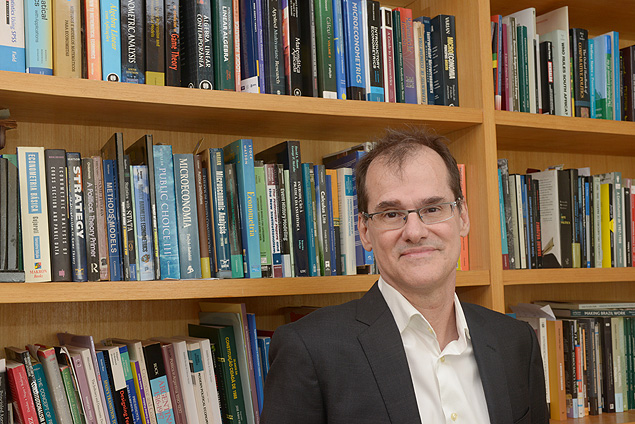Latest Photo Galleries
Brazilian Markets
10h52 Bovespa |
-0,80% | 123.740 |
16h43 Gold |
0,00% | 117 |
10h53 Dollar |
+0,55% | 5,1771 |
16h30 Euro |
+0,49% | 2,65250 |
ADVERTISING
Perfect Political Storm Threatens Rousseff Administration, Says Academic
02/23/2015 - 12h04
Advertising
FERNANDO CANZIAN
FROM SÃO PAULO
"Perfect political storm" is how the political scientist Marcus Melo, a professor at the Federal University of Pernambuco, defines the current moment of Dilma Rousseff's (PT) administration.
The causes are the austere policies that should generate unemployment, major scandals involving the Workers' Party (PT) and, from now on, street demonstrations.
"We are talking about a weakening of the executive branch never seen before in Brazil", he says. Melo is also the co-author of a book about the multi-party system in Brazil and its functioning in presidential system.
Read excerpts from the interview below.
Folha - We have a scenario of high inflation and the imminence of a major economic downturn. Rousseff's administration has a high disapproval rating, now haunted by cases of corruption. How do you see the impact of this in governance?
Marcus Melo - The setting is the same, with a progressive tendency of even greater strain, since the most important effects of this crisis are still to come. Increases in rates will be seen, in practice, only in the coming months, as well as the consequences of the increase in interest rates on buying power.
However, the most important thing is the employment, where we have a paradox. It is still common for people to repeat the unemployment rate is low. But it is expected that, from mid-year, this one positive indicator will increase. Considering the scale of the problems, mainly fiscal ones, you can expect a rollback starting in 2017 only.
The Workers' Party (PT) and the President are identified with the current scenario of economic deterioration and corruption scandals. What are the consequences of that, considering the negative expectation on these two fields?
This conjunction of slumping economy and scandal is explosive. And there are three key elements in course: austere policies, people outraged with scandals and the likely effect of them on the streets, such as the demonstrations Pro impeachment scheduled for March 15 across the country.
In Rousseff's case, it should manifest in a very intense way. There will be a massive diffuse discontent, but without an institutional space, elections, to show it. But we have the streets.
There will be demonstrations, and whether they may or may not lead to impeachment, this will depend on the evidence found showing the president's personal involvement in the scandal. We should see different demonstrations. And the public opinion will be essential to endorse and support the Judiciary on this ongoing investigation.
How do you see its political outcome?
It's a perfect political storm scenario, with austere policies cutting jobs, massive scandals and people on the streets.
On top of that, now the government has lost political control of both houses in Congress: in the Chamber of Deputies and the Senate. The Government's support party, PMDB, is almost an opponent now.
To build stable majorities, Presidents must offer ministries to their coalition partners and meet individual parliamentary interests, often corrupt, but through democratic amendments. This is a bargaining chip. The third element is to offer positions in the bureaucracy, splitting the government. These three elements guaranteed the stability of Fernando Henrique's (FHC) government (1995-2002).
Now, Lula's administration (2003-2010) had 25% of the seats of the coalition and 60% of the ministries. During FHC's administration, the ratio was 25% of the seats and only 25% of the ministries. Obviously, the Worker's Party had to compensate this power-sharing in a not so heterodox way, and the monthly allowance [the mensalão scandal] was exactly that. It was a transfer of resources to parliamentarians who were ideologically distant from the government.
Is the adjustment threatened?
The risk now is the deputies do not consider the fiscal issues. That leaves the President of the Republic a hostage to leaders that cannot take political responsibility, and who have no incentive to behave in a disciplined manner, despite the cost that this will bring for the country as a whole.
From an economic policy perspective, I think that is the biggest concern. We have a President of the Republic, who is fundamentally interested in the adjustment, but who is a hostage to the Congress, dominated by other political forces that are not necessarily liable if the adjustment is not done. The blame will fall on the president.
On the other hand, there is not the slightest chance of happening any macro or microeconomic reform. There will only be a management of austerity, a politically troubled situation.
This recession is here to stay, amid great dissatisfaction. In this context, Rousseff may relinquish her presidential power. She might give up and conduct an economic policy of making tweaks here and there, keeping herself in a kind of swamp.
Translated by JULIANA CALDERARI and JILL LANGLOIS
Read the article in the original language
| Leo Caldas/Folhapress | ||
 |
||
| The political scientist Marcus Melo is a professor at the Federal University of Pernambuco |



